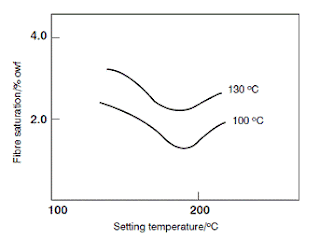Loose PET fibre is usually dyed directly without pretreatment because emulsification of the small amount of superficial processing chemicals is easy. This is not the case for knitted goods, that may contain additional oil or wax, or for woven goods with sized warp yarns. Typical preparation involves scouring with 2 g l–1 each of soda ash (sodium carbonate) and an anionic detergent at 50 °C. Addition of an organic solvent may be useful if wax or much knitting oil is present. Because the dispersants present in the dyes or added to the dyebath are usually anionic, removal of any cationic auxiliary chemicals in the spin finish is necessary before dyeing.
When fabrics of PET are heated in water at the boil there is often considerable shrinkage as the tensions in the filaments relax. The shrinkage may be even greater at higher temperatures. Fabrics of PET can be dry heat set at 200–225 °C for 30–60 s. Alternatively, steam heat setting at 130–140 °C for several minutes is also possible but can cause a loss of strength due to some hydrolysis of the polyester. Steam setting provides dimensional stability in boiling water but, for stability to ironing, higher setting temperatures must be used.
After heat setting in air under conditions of free shrinkage, the dye exhaustion first decreases and then increases with increasing setting temperature. The minimum exhaustion occurs after setting at around 160–190 °C. If applied tension prevents fabric shrinkage during heat setting, the dye uptake/ temperature profile is similar to that under conditions of free shrinkage, but with higher uptake values. Heat setting changes the morphology of the polyester fibres. The effects on the dyeing rate and the extent of dyeing are variable depending upon the particular dye, the setting temperature and heating time, and the tension imposed.
 | |
| Influence of hot air setting temperature on dye uptake of polyester at dyeing temperatures of 100 and 130 °C |
No comments:
Post a Comment